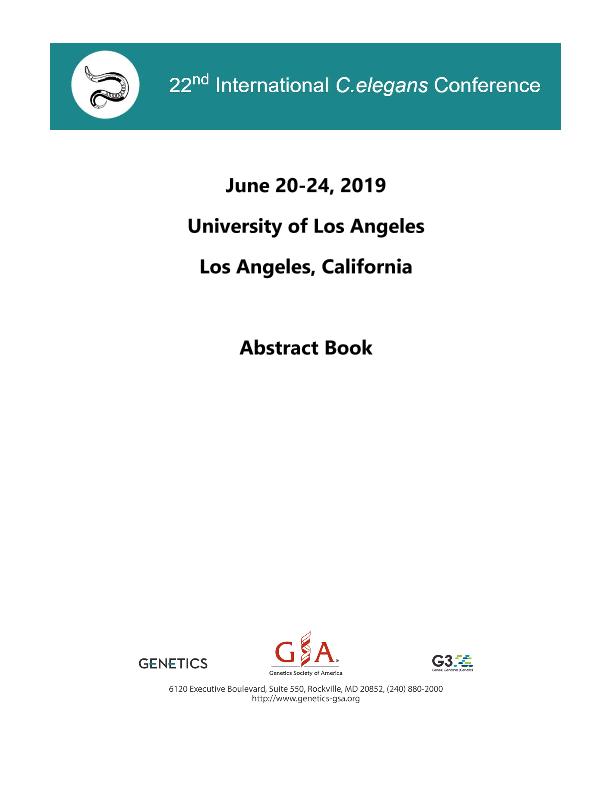Evento
The flight response impairs cytoprotective mechanisms through neural inhibition of the insulin pathway
Rayes, Diego Hernán ; de Rosa, Maria Jose
; de Rosa, Maria Jose ; Veuthey, Tania Vanesa
; Veuthey, Tania Vanesa ; Florman, Jeremy; Grant, Jeff; Blanco, Maria Gabriela
; Florman, Jeremy; Grant, Jeff; Blanco, Maria Gabriela ; Andersen, Natalia Denise
; Andersen, Natalia Denise ; Alkema, Mark
; Alkema, Mark
 ; de Rosa, Maria Jose
; de Rosa, Maria Jose ; Veuthey, Tania Vanesa
; Veuthey, Tania Vanesa ; Florman, Jeremy; Grant, Jeff; Blanco, Maria Gabriela
; Florman, Jeremy; Grant, Jeff; Blanco, Maria Gabriela ; Andersen, Natalia Denise
; Andersen, Natalia Denise ; Alkema, Mark
; Alkema, Mark
Tipo del evento:
Congreso
Nombre del evento:
22nd International C. elegans Conference
Fecha del evento:
20/06/2019
Institución Organizadora:
Genetics Society of America;
Título del Libro:
22th International C. Elegans Conference
Editorial:
Genetics Society of America
Idioma:
Inglés
Clasificación temática:
Resumen
An animal uses different survival strategies to cope with life-threatening situations. For instance, it can engage in a rapid and energy-demanding “fightor-flight” response when encountering a predator, or it can induce the gradual and long-lasting activation of highly conserved cytoprotective processes in response to environmental stressors such as hypoxia, heat, oxidative stress, or food shortage. In animals across the evolutionary spectrum the continued activation of the fight-or-flight response weakens the animal’s resistance to environmental challenges. In humans, for instance, the recurrent experience of stress in patients that suffer from post-traumatic stress disorder (PTSD) has been associated with decreased antioxidant capacity, accelerated aging and increased susceptibility to metabolic, cardiovascular and infectious diseases. However, the molecular and cellular mechanisms that regulate the trade-off between flight response and long-term stressors are poorly understood. Here we show that repeated induction of the C. elegans flight response shortens lifespan and inhibits conserved cytoprotective mechanisms. The flight response activates neurons that release tyramine, the invertebrate analog of adrenaline/noradrenaline. Tyramine stimulates the DAF-2/Insulin/IGF-1 pathway and precludes the induction of stress response genes by activating an adrenergic-like receptor in the intestine. In contrast, long-term environmental stressors, such as heat or oxidative stress, reduce tyramine release allowing the induction of cytoprotective genes. These findings demonstrate that a neural stress-hormone supplies a state-dependent neural switch between acute flight and long-term environmental stress responses and provides mechanistic insights into how the flight response impairs cellular defense systems and accelerates aging.
Palabras clave:
TYRAMINE
,
STRESS
,
LIFESPAN
,
PTSD
Archivos asociados
Licencia
Identificadores
Colecciones
Eventos(INIBIBB)
Eventos de INST.DE INVEST.BIOQUIMICAS BAHIA BLANCA (I)
Eventos de INST.DE INVEST.BIOQUIMICAS BAHIA BLANCA (I)
Citación
The flight response impairs cytoprotective mechanisms through neural inhibition of the insulin pathway; 22nd International C. elegans Conference; Los Angeles; Estados Unidos; 2019; 27-28
Compartir



